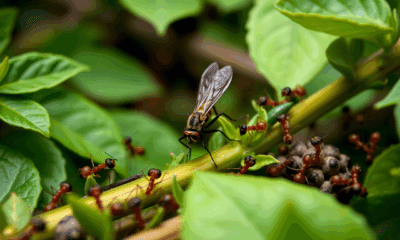While we try to keep things accurate, this content is part of an ongoing experiment and may not always be reliable.
Please double-check important details — we’re not responsible for how the information is used.
Air Quality
A Breakthrough in Biodegradable Plastics: LAHB’s Journey to Deep-Sea Decomposition
A new eco-friendly plastic called LAHB has shown it can biodegrade even in the extreme environment of the deep ocean, unlike conventional plastics that persist for decades. In real-world underwater testing nearly a kilometer below the surface, LAHB lost more than 80% of its mass after 13 months, while traditional PLA plastic remained completely intact. The secret? Colonies of deep-sea microbes actively broke down the material using specialized enzymes, converting it into harmless byproducts like CO and water.

Air Quality
Greenland’s Glacial Runoff Fuels Explosive Growth in Ocean Life
NASA-backed simulations reveal that meltwater from Greenland’s Jakobshavn Glacier lifts deep-ocean nutrients to the surface, sparking large summer blooms of phytoplankton that feed the Arctic food web.
Air Quality
Breakthrough in Bioplastics: Scientists Unveil a Stronger, More Sustainable Alternative to Petroplastics
Plastic pollution is a mounting global issue, but scientists at Washington University in St. Louis have taken a bold step forward by creating a new bioplastic inspired by the structure of leaves. Their innovation, LEAFF, enhances strength, functionality, and biodegradability by utilizing cellulose nanofibers, outperforming even traditional plastics. It degrades at room temperature, can be printed on, and resists air and water, offering a game-changing solution for sustainable packaging.
Air Quality
“The Hidden Climate Battle Between Forests and the Ocean: Trends, Drivers, and Implications for Planetary Health”
Between 2003 and 2021, Earth saw a net boost in photosynthesis, mainly thanks to land plants thriving in warming, wetter conditions—especially in temperate and high-latitude regions. Meanwhile, ocean algae struggled in increasingly stratified and nutrient-poor tropical waters. Scientists tracked this global energy shift using satellite data, revealing that land ecosystems not only added more biomass but also helped stabilize climate by capturing more carbon.
-

 Detectors10 months ago
Detectors10 months agoA New Horizon for Vision: How Gold Nanoparticles May Restore People’s Sight
-

 Earth & Climate11 months ago
Earth & Climate11 months agoRetiring Abroad Can Be Lonely Business
-

 Cancer11 months ago
Cancer11 months agoRevolutionizing Quantum Communication: Direct Connections Between Multiple Processors
-

 Albert Einstein11 months ago
Albert Einstein11 months agoHarnessing Water Waves: A Breakthrough in Controlling Floating Objects
-

 Chemistry10 months ago
Chemistry10 months ago“Unveiling Hidden Patterns: A New Twist on Interference Phenomena”
-

 Earth & Climate11 months ago
Earth & Climate11 months agoHousehold Electricity Three Times More Expensive Than Upcoming ‘Eco-Friendly’ Aviation E-Fuels, Study Reveals
-

 Agriculture and Food11 months ago
Agriculture and Food11 months ago“A Sustainable Solution: Researchers Create Hybrid Cheese with 25% Pea Protein”
-

 Diseases and Conditions11 months ago
Diseases and Conditions11 months agoReducing Falls Among Elderly Women with Polypharmacy through Exercise Intervention





























